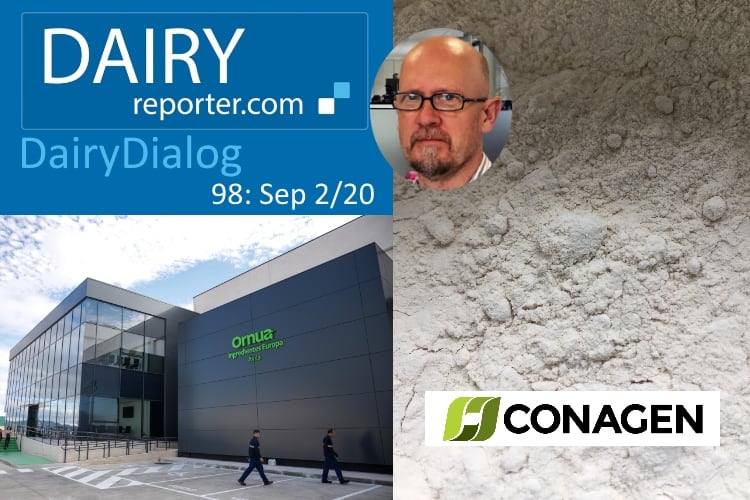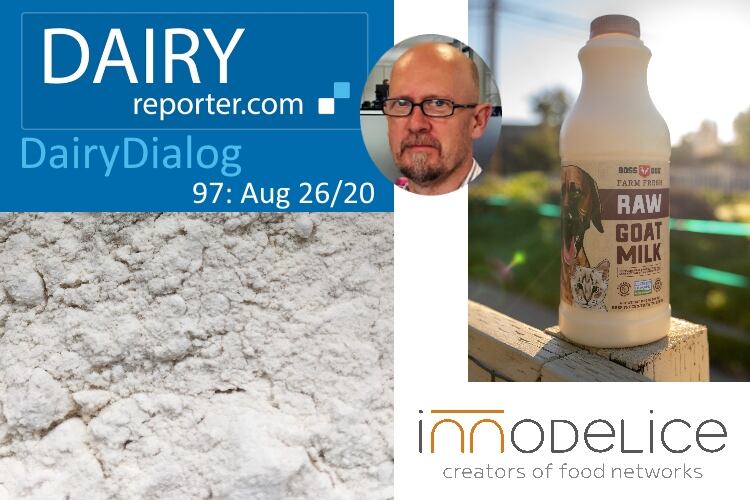Conagen HMOs for next generation infant formulas
US biotechnology company Conagen has established a novel and proprietary process for the scalable production of a non-GMO human milk oligosaccharide (HMO), an important nutritional compound only found in human milk.
The company said the micronutrition breakthrough will enable the creation of high-quality and cost-effective next generation infant formula products that most closely resemble human breast milk.
HMOs are complex sugars naturally found in human milk. They are the third largest solid component in human milk after fat and lactose, and convey a variety of benefits. HMOs are responsible for directly stimulating the immune system by promoting good gut bacteria, strengthening the gut barrier function and blocking pathogens.
The most abundant HMO in human milk is 2’-fucosyllactose (2’FL.) Cow’s milk contains very little of this compound, and for this reason the best infant formulas must be fortified with it in order to deliver the immune system benefits. Purifying the compound from either cow or human milk is unsustainable, which is why Conagen researchers said they harnessed the technology of bioconversion for a sustainable non-GMO production process.
“We leveraged our industry-leading technology for production of non-GMO certified natural sweeteners to instead make HMOs with simple enzymes rather than recombinant organisms. In this regard, our process resembles the way cheese is made,” said VP of innovation, Dr Casey Lippmeier.
After a couple years of research and development, the Conagen technology for producing the infant formula ingredient is ready for commercialization. Infant formula manufacturers can anticipate market entry of Conagen’s 2’FL in the next few months.
Beyond the use in infant formula, HMOs have potential in the dietary supplement market for immune boosting and sports performance for adults. Certain pharmaceutical applications may also be possible.
“We have made impressive investments in our capabilities for high-throughput, automated enzyme identification, design and screening. From this expanded platform, we were able to identify and improve upon an interesting natural pathway for the biosynthesis of 2’FL which is more efficient than established routes,” said Lippmeier, who added a patent application has been filed on the process.
Conagen said it is focused on introducing nature-based and sustainable ingredients that improve upon existing options or which represent completely novel ingredient solutions. This focus enables continued innovation in infant nutrition and dietary supplements.
Earlier this year, Conagen announced the development of a sustainable process for the production of the human milk protein lactoferrin, which when added to infant formula will convey most of the nutritional properties of lactoferrin from breast milk. The first-of-its-kind natural lactoferrin protein is produced via a fermentation process at commercial-scale. Lactoferrin is necessary as it plays an important role in the newborn immune system and contributes to healthy infant digestion and iron nutrition.
Ornua Ingredients Europe riding out COVID storm
The foodservice sector has experienced an unprecedented four months during which it saw a near collapse in sales as the COVID-19 crisis hit.
The initial lockdowns introduced across Europe saw foodservice orders fall in the region of 70%. This in turn saw a major reduction in production level requirements and had a huge impact on Ornua Ingredients Europe.
In response the business focused on five key areas to manage through the pandemic: Close collaboration with customers; identifying new opportunities for the business; supporting Irish-headquartered Ornua’s consumer retail Foods business to meet initial demand due to consumer panic buying. reviewing medium to long-term strategy and driving further efficiencies across the supply chain; and building stocks to supply customers once lockdown restrictions lift.
To meet the changing demands of its UK customers, Ornua Ingredients Europe said it quickly flexed its processing capacity and capabilities. An example of this was its ability to provide a consumer-oriented offer to meet the increase in demand for cheese from UK retail shoppers.
Working with Ornua Foods UK, which supplies retail cheese, Ornua Ingredients Europe’s Nantwich facility, within 10 days of the lockdown, adapted to produce 500g consumer-sized block, grated and sliced packs under its Spinneyfields cheese foodservice brand for UK retailers. As a result, Ornua Ingredients Europe produced more than 350,000 packs of cheese for consumers across the UK, helping keep cheese on shelf during the initial stages of lockdown.
Joan Bombardo, managing director of Ornua Ingredients Europe, said, “The COVID-19 pandemic has given rise to significant pressures for all in the dairy supply chain. From the collapse in foodservice sales to consumer panic buying, we have witnessed unprecedented challenges and had to adapt rapidly to changing customer and consumer demands. In response, working closely with colleagues from across the Ornua Group, we quickly flexed our processing capabilities and capacity to meet the new requirements of the market.
“Our ability to deliver a range of high-quality consumer cheese pack formats, within a matter of days of the lockdown commencing, is testament to the commitment and professionalism of all at Ornua Ingredients Europe and in particular the team at Nantwich. In doing so, this has helped offset some of the impact that the lockdown is having on our foodservice and wholesale sales which, for the avoidance of doubt, will remain our core focus as hopefully we return to a more normal market environment.”
Ornua Ingredients Europe said its sales in Continental Europe have bounced back as lockdown measures have been eased and demand in its Spanish facility is now back to pre-COVID levels. This has been helped by Europe being ahead of the UK in relaxing lockdown measures; the fact that many of Ornua’s major European/global QSR partners were able to open earlier and have performed better than other foodservice businesses; and by the winning of a new customer through the leveraging by Ornua of investment in pizza rope technology at its Avila facility.
Bombardo said, “Continental Europe is ahead of the UK and we have seen volumes significantly increase through our QSR branded customers, with some almost back to pre-COVID levels. We believe consumers will continue to visit trusted QSR brands whose offer can be adapted quickly to the new norm and who have very robust and flexible supply chain partners such as ourselves.”
UK weekly sales during July increased by more than 45% compared to average weekly sales in April. This reflects the opening of the hospitality sector in July in England and the VAT cut focused on hospitality and tourism announced by the UK Government from mid-July. However, Ornua believes that it will still be some time before sales are back to pre-COVID levels.
Sales to export markets outside of Europe where strict lockdown restrictions are still in place, e.g. Latin America, are still very weak, the company said.
Ornua believes it will be a considerable time before foodservice sales recover to near pre-COVID levels and that all in the sector will have to adapt to a ‘new normal’ market environment. Moving forward, Ornua sees challenges and opportunities within the UK and European foodservice arena.
Bombardo said, “In the short term we obviously face the potential challenge of demand falling back should we see a major second wave of the virus and the re-imposing of lockdown measures. While in the medium term, as the economic impact of COVID becomes apparent the sector will inevitably contract and consolidate as businesses react to lower and changing consumer demands. Words being used in the industry are things like range rationalization, reduced complexity, simplicity, digitalization, value engineering, supply chain efficiency and agility. In many ways this is a correction that has been coming for a while and on a positive note will ensure the industry can survive and move forward.
“One thing we know for sure is that businesses who are on the front foot, have solid supply chains and work in partnership with customers will thrive in the future. Channels that have done well throughout the COVID pandemic are those in takeaway/delivery who have been able to adjust their business models quickly. We have seen that success with several of our specialist pizza cheese foodservice customers whose volumes haven’t really been that affected by COVID-19.
“Our business is oriented towards foodservice across Europe and we are working very hard with our customers as we come out of lockdown. Our extensive manufacturing footprint across the UK and Spain coupled with our scale and agility in supply chain has and will continue to stand us in good stead for whatever the future brings.”



